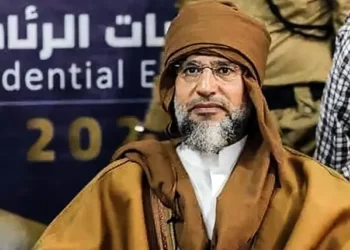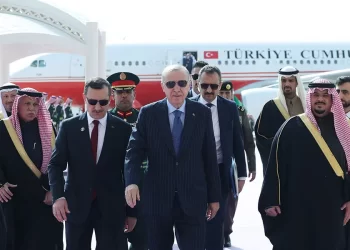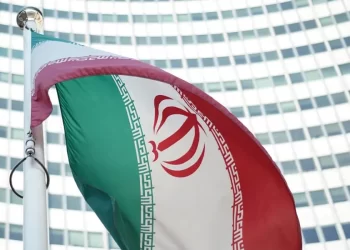MOSCOW (news agencies) — U.S. journalist Evan Gershkovich, who has been jailed for over a year in Russia on espionage charges, will stand trial in the Ural Mountains city of Yekaterinburg, where he was detained, authorities said Thursday.
An indictment of The Wall Street Journal reporter has been finalized and his case was filed to the Sverdlovsky Regional Court in the city about 1,400 kilometers (870 miles) east of Moscow, according to Russia’s Prosecutor General’s office. There was no word on when the trial would begin.
Gershkovich, 32, is accused of “gathering secret information” on orders from the CIA about Uralvagonzavod, a facility in the Sverdlovsk region that produces and repairs military equipment, the Prosecutor General’s office said in a statement, revealing for the first time the details of the accusations against him.
Gershkovich was detained while on a reporting trip to Yekaterinburg in March 2023 and accused of spying for the United States. The reporter, his employer and the U.S. government denied the allegations, and Washington designated him as wrongfully detained.
Russia’s Federal Security Service, or FSB, alleged after arresting Gershkovich that he was acting on U.S. orders to collect state secrets but provided no evidence to back up the accusations.
The U.S. State Department spokesman Matthew Miller slammed the development, saying there was “absolutely zero credibility to those charges” and adding that the U.S. government would continue to work to bring Gershkovich home.
“Evan has done nothing wrong. He should never have been arrested in the first place. Journalism is not a crime,” Miller said. “The charges against him are false. And the Russian government knows that they’re false. He should be released immediately.”
The Biden administration has sought to negotiate his release, but Russia’s Foreign Ministry said Moscow would consider a prisoner swap only after a verdict in his trial.
“Russia’s latest move toward a sham trial is, while expected, deeply disappointing and still no less outrageous,” a statement by Almar Latour, Dow Jones CEO and publisher of the Journal, and Emma Tucker, the Journal’s editor in chief, said.
They added that the charges against Gershkovich were “false and baseless.”
“The Russian regime’s smearing of Evan is repugnant, disgusting and based on calculated and transparent lies. Journalism is not a crime. Evan’s case is an assault on free press,” the statement said. “We had hoped to avoid this moment and now expect the U.S. government to redouble efforts to get Evan released.”
Roger Carstens, the Biden administration’s special presidential envoy who serves as the U.S. government’s top hostage negotiator, said that though he had been hopeful about striking a deal to get Gershkovich home before this point, the latest development “doesn’t slow or stop us down.”
“The bottom line is, this was not unexpected,” he said.
Uralvagonzavod, a state tank and railroad car factory in the city of Nizhny Tagil, about 100 kilometers (60 miles) north of Yekaterinburg, became known in 2011-12 as a bedrock of support for President Vladimir Putin.
Plant foreman Igor Kholmanskih appeared on Putin’s annual phone-in program in December 2011 and denounced mass protests occurring in Moscow at the time as a threat to “stability,” proposing that he and his colleagues travel to the Russian capital to help suppress the unrest. A week later, Putin appointed Kholmanskikh to be his envoy in the region.
Putin has said he believed a deal could be reached to free Gershkovich, hinting he would be open to swapping him for a Russian national imprisoned in Germany, which appeared to be Vadim Krasikov, who is serving a life sentence for the 2019 killing in Berlin of a Georgian citizen of Chechen descent.
Asked last week by media about Gershkovich, Putin said the U.S. is “taking energetic steps” to secure his release. He told international news agencies in St. Petersburg that any such releases “aren’t decided via mass media” but through a “discreet, calm and professional approach.”
“And they certainly should be decided only on the basis of reciprocity,” he added in an allusion to a potential prisoner swap.
Gershkovich faces up to 20 years in prison if convicted.
He was the first U.S. journalist taken into custody on espionage charges since Nicholas Daniloff in 1986 at the height of the Cold War. Gershkovich’s arrest shocked foreign journalists in Russia, even though the country had enacted increasingly repressive laws on freedom of speech after sending troops into Ukraine.









